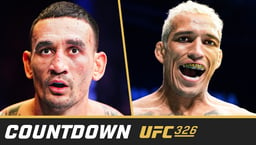
Issue 080
October 2011
Drugs cheat? For me, Nate Marquardt’s expulsion from the UFC has been the most controversial story of 2011.
Wikileaks could have done us all a favor, given the mystery surrounding his removal from the Versus 4 event, and the world’s leading MMA organization, less than 48 hours before he was due to fight early in July.
When it did come out days later, Marquardt, a former UFC middleweight title contender, insisted the elevated testosterone levels, which had been found by the New Jersey authorities (by State law Pennsylvania, the fight’s scheduled location, is precluded from making public an individual’s medical history), were the result of testosterone replacement therapy.
That’s what Marquardt blamed for his immediate sacking by UFC president Dana White. Blaming himself might have been the right thing to do. You’d think Marquardt would have learned his lesson. In August 2005, Marquardt, on his debut in the UFC at the very first Ultimate Fight Night card in Las Vegas, claimed a points decision over veteran Ivan Salaverry, but was quickly followed by a suspension from the Nevada State Athletic Commission. Marquardt had tested positive for high levels of nandrolone, an anabolic steroid.
He maintains to this day he only used over-the-counter supplements. But it makes not a jot of difference. Elite professional athletes must know what they are putting in their bodies. Their body is their office. Having been re-instated six months later, his career resumed.
Fast forward to July this year. Marquardt had been the main event protagonist against Rick Story, but that was cut short even before the weigh-in.
By announcing on Twitter to his million-plus followers that Marquardt would no longer be fighting, White opened the door for a full and clear explanation from the 32-year-old Wyoming native.
Yet it was days before Marquardt emerged and spoke about the events, revealing for his part that his license had been denied by the Pennsylvania authorities after his testosterone levels had failed to return to normal following a previous hormone treatment.
Frankly, this stuff is wearing thin. Marquardt’s claims that for almost a year he was “sluggish and my memory had gone out the window,” that he was “irritable” may indeed be true, but it is the same reason given by Chael Sonnen, and I’m certain that we are going to hear it echoed by other fighters.
Why should fighters be allowed to apply for a “therapeutic use exemption?” It makes no sense to me. If a fighter’s regular testosterone levels are found naturally low, thus requiring medication, then arguably it is time to hang up the gloves and coach.
Sonnen tested positive for high testosterone levels after his UFC 117 bout with Anderson Silva in August 2010 which has kept him out of action for almost 14 months (he’s returning, of course, in a cracking middleweight contest with Brian Stann, mouth versus military).
Sonnen cited the same reasons as Marquardt. Although Nate has hinted that PSAC Commissioner Greg Sirb will lift his suspension, I understand the UFC are likely never to show any interest in him again.
FIGHTS TO EXCITE
A BJ Penn versus Carlos Condit tear-up is a brilliant one for UFC matchmaker Joe Silva. The pair called one another out on Twitter, now seen as the newsround for fighters, but it means the ditch for Jon Fitch, yet again. Fitch (23-3-1 MMA, 13-1-1 UFC) cannot re-invent his fighting style, but he could do himself some favors by making himself more marketable. Deep down, he is a fascinating character. But we need to see it.
The UFC is beginning to reap the benefit of merging the WEC with the UFC. I can’t wait to see how Japanese featherweight Hatsu Hioki progresses in the division.
Hioki makes a high-profile start on the main card at UFC 137 (GSP v Diaz), against what should be no more than a decent test in George Roop. Is the six-foot, nine-year veteran, a black belt in jiu-jitsu no less, the antidote to the brilliance of José Aldo?










